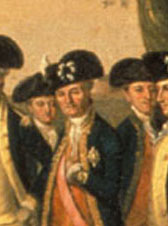Jean-Baptiste-Donatien de Vimeur, Comte de Rochambeau (1725-1807)

The Comte de Rochambeau was the commander of all French forces in America during the War for Independence. His most important contribution came during the Yorktown Campaign, in which he collaborated with George Washington to force the surrender of a major British army under Charles Cornwallis.
Rochambeau was born on July 1, 1725, in the Château de Rochambeau on the Loir River near Vendôme, France, approximately 40 miles southwest of Paris. The third son of an aristocratic but not especially wealthy family, Rochambeau was destined for a life in the Catholic Church before his older brother's death and the War of the Austrian Succession turned his attention to the French army. During that eight-year conflict and the subsequent Seven Years War, Rochambeau amassed such a distinguished record that by 1761, at the age of 36, he had been promoted to Maréchal de Camp and appointed inspector of the French cavalry. Over the next 15 years, Rochambeau devoted himself to improving training and discipline throughout the army in anticipation of the next war against Britain.
That opportunity came in 1780 when King Louis XVI gave Rochambeau, promoted to Lieutenant General, command of the expeditionary force sent to America to support France's new alliance with the United States. He and 5,500 French troops arrived in Newport, Rhode Island, on July 10, 1780. Rochambeau did not have the opportunity to profitably employ those troops against the British until the next year when Charles Cornwallis took his army into Virginia and established a problematic defensive position at Yorktown. Recognizing that the dispatch of a French fleet to America from the West Indies gave them the perfect opportunity to isolate and then destroy the seriously weakened Cornwallis, Rochambeau persuaded George Washington to concentrate their combined force on the Virginia Peninsula. Together the commanders successfully executed an extraordinary operation that required speedily moving 12,000 men, their artillery and supplies, and two French fleets to the Chesapeake without alarming the British commanders there or in New York. This they accomplished with astonishing success. Washington and Rochambeau arrived in Williamsburg, Virginia, on September 14, 1781, and the combined forces converged on Yorktown two weeks later. The Siege of Yorktown, overseen mainly by Rochambeau given his experience, began shortly thereafter. The campaign effectively ended the Revolutionary War with Cornwallis's surrender on October 19. Rochambeau and his troops remained in Williamsburg until the following June.
Rochambeau returned to France and received the King's thanks for his success in America. He continued to correspond with Washington and even struck up an exchange with Cornwallis, whom he met on a trip to England in 1787. Rochambeau attempted to retire from active duty but was thwarted by the intensification of the French Revolution, begun in 1789. Louis XVI gave him command of a major army and promoted him to Marshal of France. The King's deposition (and execution) by the anti-aristocrat revolutionaries and the rise of Robespierre, however, put Rochambeau's life in danger when he was arrested and imprisoned in Paris during the Reign of Terror in 1793. Robespierre's death in 1794 ended the Terror and thereby cancelled Rochambeau's date with the guillotine. He then retired to the Château de Rochambeau and died there on May 12, 1807, at the age of 83. He is buried in a tomb at Thoré-de-Rochette, very near his home.








